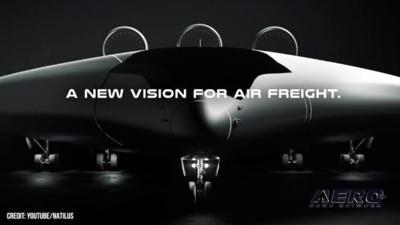Big Betting on Inchoate Technologies Continues
Founded in 2016 by former Piper lead aerodynamicist Aleksey Matyushev and aerospace engineer Anatoly Star, Natilus is a San Diego, California-based designer and builder of autonomous cargo aircraft. The company plans to fly a full-scale prototype of its Blended-Wing-Body (BWB) concept in 2024.

Presently, Natilus intends to offer three iterations of its autonomous cargo aircraft: the Kona, a short-haul feeder UAV with a 3.8-metric-ton maximum payload; the Alisio, a medium/long-range UAV with a sixty-metric-ton maximum payload; and the Nordes, a long-range cargo UAV with a one-hundred-metric-ton payload.
To date, Natilus has logged north of $6.8-billion in order commitments and 460+ aircraft pre-orders from major airlines and supply-chain integrators the likes of Volatus Aerospace, Flexport, Astral, Aurora International, and Dymond.
Nautilus posits the extant, $5-trillion global supply chain is in crisis, and sets forth that its aircraft represent a turnkey fix for such.
On 26 January 2023, Nautilus announced that Ameriflight—the DFW-based cargo airline and largest FAA Part 135 cargo air-carrier—had signed a purchase agreement valued at $134-million for twenty of Natilus’s Kona feeder aircraft.
Ameriflight president and CEO Alan Rusinowitz stated: “Through this strategic partnership, we are positioning Ameriflight to build the roadmap for the future in cargo operations and be the first regional operator for Natilus in the United States. Our goal is to grow our product and transform the way we do business through innovation and collaboration, and now through this new partnership with Natilus, Ameriflight will connect the world safely within a sustainable business model.”
Currently, Ameriflight serves two-hundred destinations throughout the United States, Canada, Mexico, the Caribbean, and South America. The company’s fleet comprises Beechcraft 99 and 1900, Embraer EMB-120 Brasilia, Fairchild Swearingen SA227 Metroliner, and Saab 340B models, and serves major U.S. financial institutions, freight forwarders, laboratories, and overnight couriers. Ameriflight provides feeder services for overnight express carriers nationwide and internationally. The carrier’s largest customer is United Parcel Service (UPS).
Natilus co-founder and CEO Aleksey Matyushev remarked: “Innovation in design allows the Natilus fleet to carry more volume at lower costs, and the exploration of new sustainable fuels will lower carbon emissions. The Ameriflight agreement is a major move forward for the air cargo industry to strengthen the regional supply chain.”

Mr. Matyushev added: “Developing autonomous solutions that are purpose-built to address the needs of the air cargo market is one important step toward developing more robust long-term solutions. Autonomous technologies seek to utilize labor more efficiently by allowing a single pilot to control multiple aircraft, helping address the dire pilot shortage.”
Natilus aircraft are designed to be remotely piloted by licensed UAV operators.
Natilus asserts its carbon fiber, Blended-Wing-Body cargo aircraft can be operated at only forty-percent of the cost of comparably-sized conventional cargo aircraft. The BWB design’s efficiency derives largely of its twenty-percent drag-reduction over orthodox fixed-wing architectures.
Unlike myriad UAV start-ups, Natilus has eschewed electric powerplants in favor of conventional turboprop engines—a decision Mr. Matyushev attributes to the paucities of range and power characteristic of current aircraft electric propulsion schemes.
“Electrification is great, but not at the range and payloads we’re talking about,” Matyushev declared. “We don’t want to carry one pound of cargo and all batteries. It just doesn’t make a lot of sense; that technology is still not quite there yet for the routes that our customers are most interested in.”
Natilus has entered into a contractual agreement with Pratt & Whitney for the acquisition of storied Canadian marque’s PT6A-67D turboprop engines.
 ANN's Daily Aero-Term (12.01.25): Convective SIGMET
ANN's Daily Aero-Term (12.01.25): Convective SIGMET ANN's Daily Aero-Linx (12.01.25)
ANN's Daily Aero-Linx (12.01.25) NTSB Final Report: Remos Aircraft GmbH Remos GX
NTSB Final Report: Remos Aircraft GmbH Remos GX Aero-News: Quote of the Day (12.02.25)
Aero-News: Quote of the Day (12.02.25) ANN's Daily Aero-Term (12.02.25): Coupled Approach
ANN's Daily Aero-Term (12.02.25): Coupled Approach




